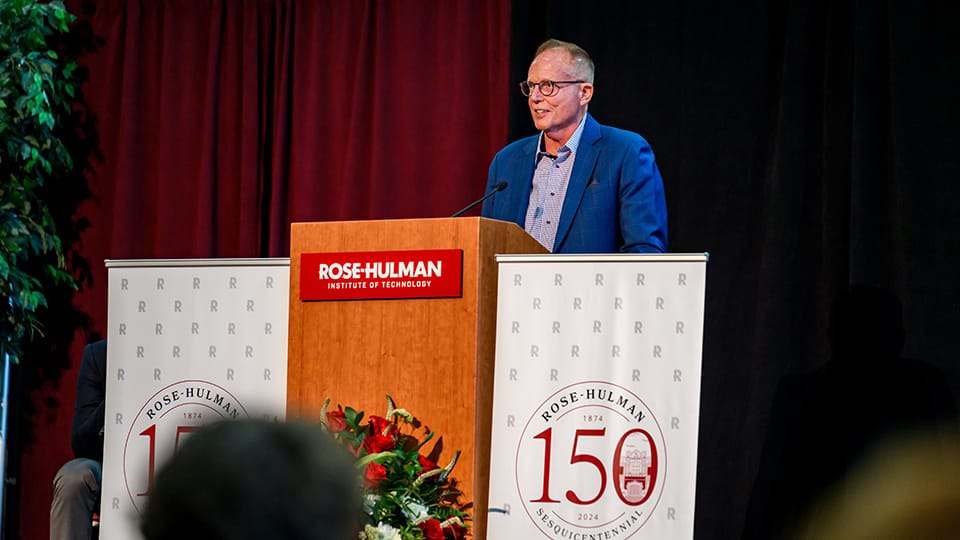Rose-Hulman unveils new strategic plan
Subscriber Benefit
As a subscriber you can listen to articles at work, in the car, or while you work out. Subscribe Now
Rose-Hulman Institute of Technology celebrated its sesquicentennial on Thursday, which included the unveiling of the school’s new, 10-year strategic plan.
The plan, dubbed “Advancing by Design,” was created following a two-year planning process and features a set of goals that the school says will “set a framework for the direction for the Institute over the next decade.”
“This plan is a reflection of our collective vision—a commitment to not just sustain, but to elevate our legacy,” President Robert Coons said during the celebration.
Coons told Inside INdiana Business it was time to revisit the institute’s goals after its previous 10-year plan was completed in 2022.
“We spent over a year gathering input from all constituencies, so not only faculty, staff, and current students, but all alums that cared to weigh in on the future of STEM education,” Coons said. “In particular, what was best about a Rose Hulman education? What was most beneficial to them as alumni and in the workforce, or in education or other fields? And where we had areas where we needed to improve or pay more attention to or have more focus. We also spent a fair amount of time assessing when students are applying to Rose-Hulman, what they’re asking for.”
Coons said one of the key pieces of feedback that they received from current and prospective students was how could they use their STEM education to have an impact on the challenges facing the world.
After gathering all of the input from stakeholders, Rose-Hulman identified four themes for the new strategic plan.
The first theme is infusing sustainability into the Rose-Hulman education and culture. Coons said the theme is two-fold for the institute–the first being making sure that the campus operates with a focus on its impact on the environment.
“Those are areas where we we’ve done some good work, but we think we can do better as a campus in terms of demonstrating that,” he said. “So we’re exploring the institution of some solar energy sources, and actually, perhaps a solar farm to support the campus and exploring that energy source. But [we’re] looking at a number of ways in which we can operate a more sustainable environment on campus.”
The other is a focus on implementing sustainable concepts in the curricula in each of the school’s disciplines. Coons said some of the engineering disciplines have have elements of sustainability, but they haven’t been highlighted as much as they could be.
“We have a group that’s starting work on taking a deep dive into how much of that is included in the curriculum today,” he said. “Are there opportunities to really strengthen that and what did those look like, and then beginning to build those out.”
Coons said the sustainability theme is two-fold for the institute.
The second theme of the strategic plan relates to an increased focus on entrepreneurship, innovation and discovery. Coons said generally, engineering schools don’t focus on creating startups, though Rose-Hulman now has mechanisms in place to do that.
But he noted that many employers are looking for graduates who think with an entrepreneurial mindset.
They’re interested in students [who are] really thinking more creatively about how to solve problems,” he said. “Education of engineers is really focused on problem solving and creating strong problem solvers that understand the tools available to solve the world’s problems in a variety of fields. And entrepreneurial thinking helps create opportunities to do it beyond the traditional scope and scale of what an engineering curriculum is originally designed to do.”
Coons added that Rose-Hulman Ventures, an engineering consulting and product design firm that employs full-time project engineers as well as student interns, is another key to the innovation and discovery aspect of the theme.
The institute recently announced plans for the Innovation Grove district that is being planned just off campus, which Coons said will create more opportunity for students to connect with industry.
The final two themes in the strategic plan come from the previous plan where Coons said they made excellent progress, but there is more work to be done.
They include providing a global and diverse experience for students and increasing the affordability and value of a Rose-Hulman education.
“We’re an expensive institution, and we recognize that,” he said. “We think we provide the return on investment for that four-year investment that families make, and in fact, the survey data nationally that tries to capture return on investment in higher education shows that we routinely rank in the top 1% of the country. So we’re proud of that, but we still think we have work to do; we certainly have work to do to build more scholarship support and financial aid support.”
Coons said while the new strategic plan is charted for 10 years, the institute will review its progress every three years to assess where the plan is at and adjust course as needed.
